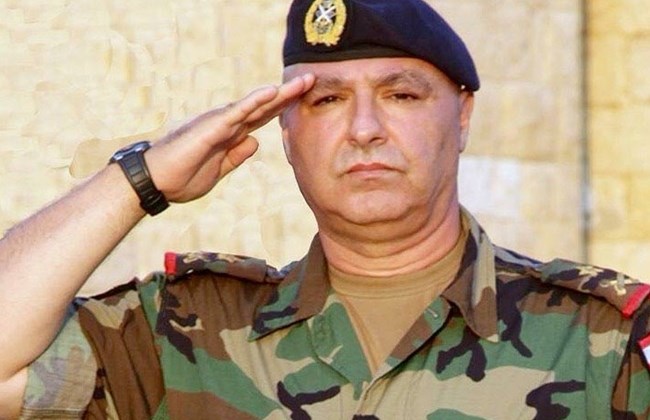General Joseph Aoun … Lebanon’s Army Commander with Many Duties
Nazeer Rida/Asharq Al-Awsat/July 22/17/
Beirut – There have not been fundamental changes to the duties of Lebanese Army Commander General Joseph Aoun from before and after he was appointed to his post. General Aoun, who waged the battle in eastern Lebanon to preserve the country’s stability and prevent the infiltration of extremist groups from the eastern border outskirts with Syria towards Lebanon when he was commander of the ninth army brigade, is experiencing the same mission now as army chief. Add to this mission other challenges, most important of which is protecting Lebanon’s internal stability and its southern and eastern borders. These challenges have determined the standards that led him to be appointed as army commander in March to succeed Jean Qahwaji. Aoun’s resume has to a great extent helped him reach this position.
Along with his military history and his academic and military higher studies, he took part, for almost an entire year, in the international counter terrorism program that was held in the United States in 2008. He also participated in an intelligence and counter terrorism workshop in 2013 and has a knowledge in “managing crises,” according to his resume. Lebanon is currently waging a “war against terrorism” on its eastern border with Syria where the army is deployed in vast regions near the Syrian al-Qalamoun area to confront extremists ISIS and al-Nusra Front members.
The army is also intensifying its security and military operations on the internal scene in order to crackdown on suspected extremist groups, dismantle sleeper cells and pursue what is known as “lone wolves” linked to ISIS and other extremists. The military intelligence, along with other security forces, have carried out several “preemptive” missions that have led to the arrest of a number of terrorist suspects or fugitives.
Adept field commander
Prior to his appointment as the 14th Lebanese army commander since the country’s independence, Aoun made a name for himself as an expert field commander. He was transferred as commander of the ninth brigade that was deployed on the southern border with Israel to the northeastern border that is “one of the terrorist passages” to Lebanon.
His name shone as an “adept field commander, who was able to contain the security and social situation in an area that is witnessing tension due to the large number of Syrian encampments that are hosting some 100,000 refugees,” said sources that have monitored his rise in the ranks. They told Asharq Al-Awsat: “On the eastern borders, General Joseph Aoun worked on fortifying military positions, especially those on the frontlines, thereby lifting the morale of his troops when he was commander of the ninth brigade.”“After his move to al-Yarzeh, the headquarters of the Army Command, he carried with him the plight of Arsal, repeatedly announcing that the military is fully prepared to defend each grain of soil of the nation, provide security and stability to the citizens and cut the hand of anyone who tries to meddle with security,” they added. Aoun had launched the concept of preemptive operations that are aimed at destroying terrorism before it spreads. He has proven his success in the many operations that were carried out and that had led to the arrest of several wanted suspects and the elimination of a number of others.
American trust
Aoun also followed up on the missions that were entrusted to him in regards to coordinating with the international community in combating terrorism. He worked on bolstering the abilities of the army through direct contact with the US military command as demonstrated by his trip to the US only two months after his appointment as army chief. He held talks there with a number of military and political officials with the aim of bolstering the capabilities of the Lebanese army.
Observers of his foreign trips told Asharq Al-Awsat that Aoun “enjoys the trust of external powers, especially American ones. He was part of several US-hosted courses, especially ones on fighting terrorism and others on military affairs. His military and field experience have garnered him great trust, especially after leading the Arsal front and the significant advances the army made there in combating terrorism.”“His ties with the Americans were strengthened after his appointment as army commander and this was evident through the regular visits that military and diplomatic officials make to the Army Command headquarters,” they added. Several officials have repeatedly said that the Lebanese army is their partner in fighting terror, saying that it is the power that is offering security and stability in a country that lies in a volatile environment. “Arms caches are therefore open to the army when the need arises,” said the observers.The sources underlined the importance of Aoun’s first trip to the US since his appointment to his post, saying that its “results will be translated into the size of US military assistance to the Lebanese army.” This includes Bradley Fighting Vehicles and Super Tucano attack aircraft.
Firm officer
Aoun began his military career in 1983 when he enlisted in the army. Since then, he has amassed a wealth of experience, as well as personal and humanitarian ties with military personnel. One of his close acquaintances told Asharq Al-Awsat that Aoun is known as a “firm officer, who firmly addresses national principles.” At the same time, he “appears to be a personal friend of the military personnel who work under his command.”“In the years preceding his appointment as army commander, he used to spend most of his free time with the military personnel to an extent that he no longer made them feel that he was their superior. This is a trait that he developed years ago and which earned him the love of his soldiers and officers,” revealed the acquaintance. Over the years, Aoun moved among the army divisions, such as the commando unit and infantry, as well as its teaching directorate, leading to his command of the ninth brigade. Throughout this time, he worked on his university degrees, obtaining a BA in Political Science, specializing in international affairs. He also holds a university degree in Military Science and is fluent in French, English and Spanish.
Constant inspections
Becoming army commander has not broken his old routines and Aoun often makes the news for carrying out inspections at various hotspots where the army is deployed. He recently inspected the army’s positions in the eastern Tufail region in the Baalbek outskirts on the border with Syria. Days ago, he stressed that the army has taken “all field measures to protect the border towns and villages and ensure the safety of their residences against any terrorist infiltration.”“The army will protect Lebanon regardless of the sacrifices and it will not listen to those seeking to hamper its mission. The army that has protected Lebanon in the most difficult times, will protect it in the present and future no matter the cost,” he declared.
Plans to develop the military institution
While his foreign trips are part of his vision to bolster the army’s capabilities, the observers say that developing the military institution “is at the top of Aoun’s priorities.” He has has, since his appointment as army commander, made it his mission to provide the military with all logistic and military support and develop its abilities amid the major challenges it is facing, starting with terrorism, which it is confronting with intelligence support and political and popular backing.His many plans for the army include the establishment of new brigades aimed at controlling the eastern and southern borders, the observers revealed.
Fateful phase amid the challenges
Those in tune with the nature of the Lebanese army’s duties at this current time agree that Aoun is “leading the army during a fateful phase due to the size of the regional challenges.”Strategy researcher Dr. Mohammed Rammal told Asharq Al-Awsat: “Several geopolitical changes are taking place around us, most notably in Iraq and Syria. Lebanon is not isolated from what is happening given that terrorism is no longer restricted to a certain region.”He noted that the Lebanese army confronted terrorism before the September 11, 2001 attacks in the US, saying that it waged the Dinniyeh battles against the so-called “Takfiri and al-Hijra” group. “There is no country that is safe from terrorism, no matter how great their military and security capabilities,” he added. “Lebanon is part of the network that is combating terror and the army, led by Aoun, is a part of it,” he stressed.
Source of strength
Despite the challenges, the army enjoys the trust of the Lebanese people, which gives it strength. Rammal said: “Aoun is commanding the army at a time when there is popular consensus over it. This is one of the golden phases to unite around the army.”
Another source of its strength lies in the “unprecedented” coordination between all of its agencies in that information is exchanged between them in ways that were not seen before, he explained.The military also enjoys regional and international support, he noted. Moreover, and despite the controversy that surrounded its Arsal raid in late June, Rammal said: “An army unit entered the camp and was faced with five suicide bombers who blew themselves up. No Syrian civilian was hurt by army bullets, but a number of soldiers were wounded in the bombings. This is an achievement in itself.”
The lack of casualties “indicates a level of professionalism that the world trusts and which prompted it to offer its congratulations to the military.”
International Humanitarian Law directorate
The Arsal operation did however lead to the death of four Syrian detainees held by the army. They died of health complications, but it still led to local and international outcry and a demand for a transparent investigation in the case. The army complied and tasked its International Humanitarian Law directorate to investigate. This directorate, said Rammal, is in charge with coordinating with international humanitarian and rights groups whenever the military carries out a crackdown. Formed in 2009 before the eruption of the Syrian crisis, the directorate follows up on humanitarian cases and ensures that soldiers on the ground respect International Humanitarian Law.



















